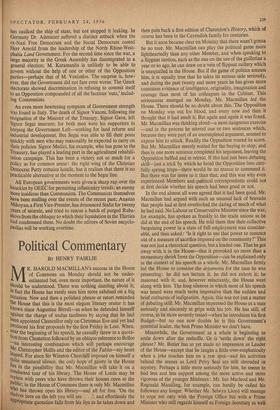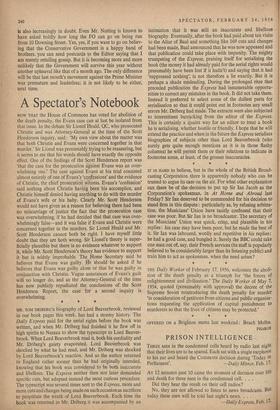Political Commentary
BY HENRY FAIRLIE R. HAROLD MACMILLAN's success in the House of Commons on Monday should not be under- estimated but, even more important, the nature of it 4,110111d be understood. There was nothing dazzling about it; In fact the House has rarely seen him more subdued on a big occasion. Now and then a polished phrase or retort reminded the House that this is the most elegant literary orator it has known since Augustine Birrell—as when he defended himself against the charge of undue tardiness by saying that he had been appointed Chancellor only on Christmas Eve and yet had Produced his first proposals by the first Friday in Lent. When, near the beginning of his speech, he casually threw in a quota- tion from Chesterton followed by an oblique reference to Belloc `an interesting combination which will perhaps encourage Ir. Christopher Hollis and the editor of the Tablet—my heart leaped. For since Sir Winston Churchill imposed on himself a quite unnatural silence, the only hope of gaiety in the House Ilea in the possibility that Mr. Macmillan will take it on a Conducted tour of his library. The House of Lords may be replete with peers who have thrown their houses open to the Public; in the House of Commons there is only Mr. Macmillan vv,,no has thrown open his library—and all for free. 'On the !h elves here on the left you will see . . .', and effortlessly the appropriate quotation falls from his lips as he takes down and then puts back a first edition of Clarendon's History, which of course has been in the Cavendish family for centuries.
But it soon became clear on Monday that there wasn't gonna be no tour. Mr. Macmillan can play the political game more lightheartedly than any other Member, and when speaking to a flippant motion, such as the one on the use of the guillotine a year or so ago, he can draw on a vein of flippant raillery which is unequalled in the House. But if the game of politics amuses him, it is equally true that he takes its serious side seriously, and during the past twenty and more years he has given more consistent evidence of intelligence, originality, imagination and courage than most of his colleagues in the Cabinet. This seriousness emerged on Monday. Mr. Macmillan led the House. There should be no doubt about this. The Opposition on Monday was out for blood, and every now and then it thought that it had smelt it. But again and again it was foxed. Mr. Macmillan was thinking aloud—a most dangerous exercise —and in the process he uttered one or two sentences which, because they were part of an uncompleted argument, seemed to expose him to attack. Readily the Opposition roared its scorn. But Mr. Macmillan merely waited for the baying to stop; and then in one more sentence completed his argument. leaving the Opposition baffled and in retreat. If this had just been debating skill—just a trick by which he lured the Opposition into care- fully sprung traps—there would be no reason to commend it. But there was far more to it than that, and this was why even experienced Members and political correspondents could not at first decide whether his speech had been good or not.
In the end almost all were agreed that it had been good. Mr. Macmillan had argued with such an unusual lack of bravado that people had at first overlooked the daring of much of what he had said. No Labour or Conservative Minister since the war, for example, has spoken as frankly to the trade unions as he did at the end of his speech. He told them that their collective bargaining power in a state of full employment was consider- able, and then asked : 'Is it right to use that power to contract out of a measure of sacrifice imposed on the community?' This was not just a rhetorical question, but a loaded one. That he got away with it in the House—that it provoked no more than a momentary shriek from the Opposition—can be explained only in the context of his speech as a whole. Mr. Macmillan firmly led the House to consider the arguments for the case he was presenting : he did not lecture it; he did not exhort it; he reasoned with it; and, however reluctantly, the House went along with him. The long silences in which most of his speech was heard were much more impressive than the sudden and brief outbursts of indignation. Again, this was not just a matter of debating skill. Mr. Macmillan impressed the House as a man seriously and sincerely at grips with his job. He has still, of course, to be more severely tested—when he introduces his first Budget—but no one now doubts he is this Government's potential leader, the best Prime Minister we don't have.
Meanwhile, the Government as a whole is beginning to settle down after the reshuffle. Or is 'settle down' the right phrase'? Mr. Butler has as yet made no impression as Leader of the House—except that he laughs a little over-emphatically when a joke touches him on a raw spot—and his activities behind the scenes as Lord Privy Seal are still shrouded in mystery. Perhaps a little more seriously for him, he seems to find less and less support among the more active and more vigorous of the younger Ministers : Mr. Ian Macleod and Mr. Reginald Maudling, for example, can hardly be called his followers any longer. Whether Mr. Selwyn Lloyd will manage to cope not only with the Foreign Office but with a Prime Minister who still regards himself as Foreign Secretary as well is also increasingly in doubt. Even Mr. Nutting is known to have asked boldly how long the FO can go on being run from 10 Downing Street. Yes, yes, if you want to go on believ- ing that the Conservative Government is a happy band of brothers, you can send postcards to the Editor saying that I am merely retailing gossip. But it is becoming more and more unlikely that the Government will survive this year without another upheaval like that of a month ago. The only difference will be that last month's movement against the Prime Minister was premature and leaderless; it is not likely to be either, next time.



































 Previous page
Previous page